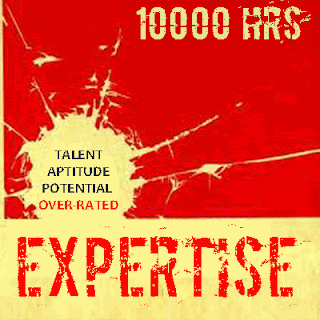Talent is over-rated.
 Talent is over-rated! As is 'potential'. What counts is action - and plenty of it! I have talked about this before - the 10,000 hour rule. it had become an accepted standard, that if you wish to achieve real expertise in any given subject - do 10,000 hours of focussed practice. Another way to interpret this is to practice for 20 hours a week, for a decade. That's the bad news! The good news is that genetic factors don't seem to come into it at all - so called 'prodigies' (mozart, tiger woods, etc) have just done the work - when you dig into their backgrounds, they all have one thing in common, they had notched up their 10,000 hours of practise, well before their peers had. In other words - and I like this - ANYONE CAN DO IT - just do the work!
Talent is over-rated! As is 'potential'. What counts is action - and plenty of it! I have talked about this before - the 10,000 hour rule. it had become an accepted standard, that if you wish to achieve real expertise in any given subject - do 10,000 hours of focussed practice. Another way to interpret this is to practice for 20 hours a week, for a decade. That's the bad news! The good news is that genetic factors don't seem to come into it at all - so called 'prodigies' (mozart, tiger woods, etc) have just done the work - when you dig into their backgrounds, they all have one thing in common, they had notched up their 10,000 hours of practise, well before their peers had. In other words - and I like this - ANYONE CAN DO IT - just do the work!One would think that we can often shortcut the road to expertise by going and asking an expert how he does what he does - and then just 'skipping' straight to that - but the problem with this approach is that the expert usually has a very limited idea of how he or she does what they do; the reason for this is due largely to so-called 'expert amnesia'. Expert amnesia refers to the lack of conscious understanding that most experts suffer from - due to the fact that the evolution of their performance took place over 10,000 hours or so of practise and the hundreds of minute (barely noticeable) improvements they made during that time sort of 'crept in' under the radar - resulting in an invisible/difficult to define set of small behaviours/skill-sets that account for much of their expert performance. When you ask them what they are doing - they usually describe their performance by saying things like 'I have a kind of gift' - 'I was always able to do this' - 'It's like a sixth sense', etc. often they don't mention their 10,000 hours of practise! I remember learning my first armbar from mount - and then immediately being asked to perform 1000 reps. Had trouble walking the next day - but I got a hold of that armbar concept pretty quickly. Within the first month of training, I had knocked up my 10,000 armbars. Secrets out! Go for it!
JBW


Comments
I got into a debate about it with my boss (who I lent the book to) b/c he didn't buy into it since he's been biking for years but is no Lance Armstrong. But I think he's missing the point, it takes 10,000, but it requires other things like "directed practice". In BJJ the equivalent would be drilling techniques, instead of just going to class and rolling. I only a blue belt now, but I have no intention of being one of those "blue belts for life" that you see at every gym. I think the 10,000 thing has appicability to BJJ so thank you for confirming that. I think there are too many people in the community trying to sell people magic bullet shortcuts to getting better on the mat.
I read a book called "Bounce:how champions are made" by Matthew Syed which talks about the same 10000 hrs of practice- referenced examples to Tiger Woods, table tennis and Chess Champions! Wondering what your thoughts are on Neurolinguistic Programming(NLP) which as u decribe tries to short circuit things.
Regards, Ken
I am surte that teaching/coaching does, to some degree, help - in that it requires that we 'break things down' to be better able to deliver to others, and in doing so, deepen our own understanding. Things like NLP - may or may not help - I am unsure, but one thing I do know, is that there is no substitute for doing the actual work. Neurons are wired together (hardwired muscle memory) through contact repetition. A lot of people do indeed look for shortcuts - and there are some - but they are mostly about the avoidance of pitfalls that others have taken. For example, if I wasted some time, repping a technique incorrectly (or at least not-optimally) then my students have the advantage of not having to waste their time making the same mistakes - but they still need to DO THE WORK. Best wishes all - JBW